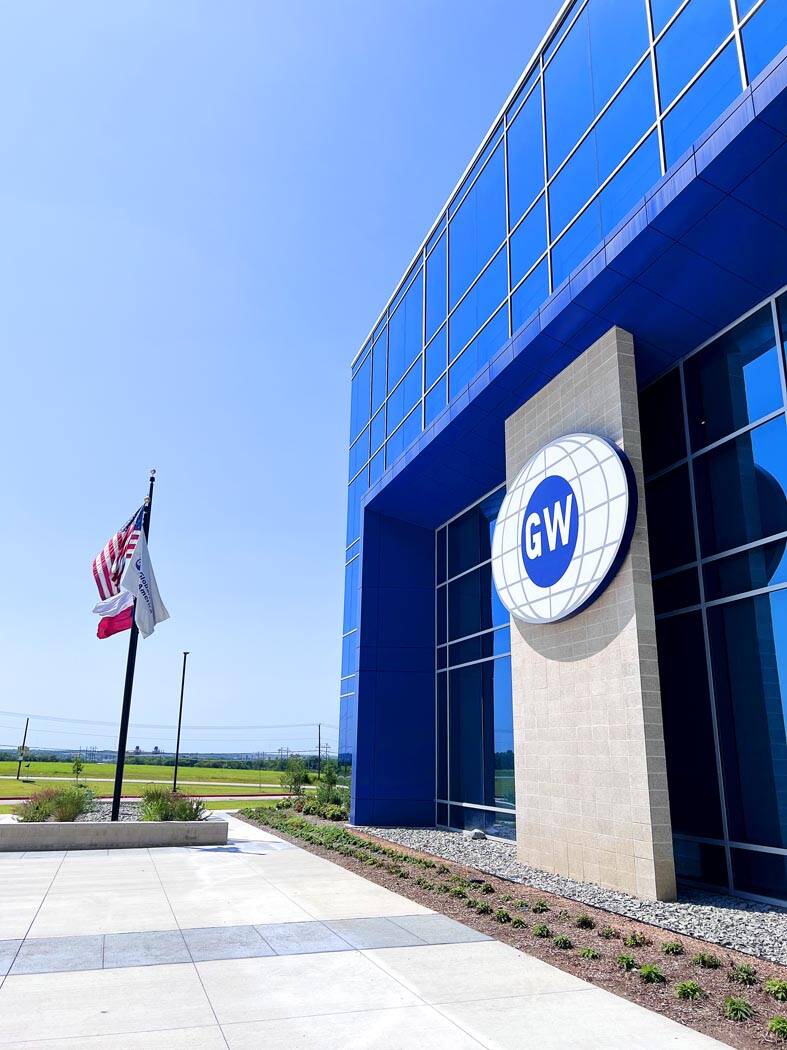GlobalWafers Co (環球晶圓), the world’s third-largest silicon wafer supplier, yesterday posted its best quarterly profit in about a year as it said artificial intelligence (AI)-related demand for advanced wafers helped boost factory utilization.
Net profit for last quarter expanded about 17 percent to NT$1.97 billion (US$63.74 million) from NT$1.68 billion in the second quarter, but down 33 percent from NT$2.95 billion a year earlier.
Earnings per share rose to NT$4,12 from NT$3.52 in the previous quarter, but were lower than NT$6.18 a year ago.

Photo: Lin Jin-hua, Taipei Times
Gross margin sank to 18.4 percent, from 25.8 percent in the second quarter and 30 percent the previous year, due to increasing depreciation costs at its production lines in the US, Italy and Japan, as well as higher energy costs and unfavorable exchange rates, the company said.
The company said that, to deal with increasing manufacturing costs, it was discussing with customers about adjusting wafer prices.
Gross margin is expected to improve this quarter, GlobalWafers chairwoman Doris Hsu (徐秀蘭) said at an earnings conference, adding that an ongoing investigation into the semiconductor market under Section 232 of the US Trade Expansion Act of 1962 is the only major uncertainty this quarter.
The potential semiconductor tariffs have prompted customers to increase demand for the company’s US wafer capacity, Hsu said.
The US market would be the company’s main growth engine in the mid and long term, she said.
The company’s Missouri plant started initial production this year and is expected to enter volume production of silicon-on-insulator wafers next year, she said.
GlobalWafers is aggressively qualifying new products for wafer production at its new plant in Texas, she added.
The company has seen the utilization rate of its 12-inch wafer facilities rise to about 95 percent, excluding those new lines, Hsu said.
Demand for small-diameter silicon wafers remains weak, she said.
Factory utilization rate for 8-inch wafers stood at 80 percent, while that for 6-inch wafers was lower than 70 percent, she said.
Global supply capacity for less advanced wafers still surpasses demand by 5 percent to 10 percent, Hsu said.
The company has observed more encouraging signs for next year, Hsu said.
It expects to receive additional government subsidies totaling US$100 million from the US and Europe next year, she said, adding that those subsidies would help strengthen the company’s financial flexibility.
The company said its capital investment spree has entered a consolidation phase after most new factory constructions were completed, implying an increase of the company’s profitability in the following quarters.
The company’s inventory level has returned to a “very healthy” range seen in late 2023 and early last year, reflecting solid inventory management and a stable foundation for growth, she added.

In Italy’s storied gold-making hubs, jewelers are reworking their designs to trim gold content as they race to blunt the effect of record prices and appeal to shoppers watching their budgets. Gold prices hit a record high on Thursday, surging near US$5,600 an ounce, more than double a year ago as geopolitical concerns and jitters over trade pushed investors toward the safe-haven asset. The rally is putting undue pressure on small artisans as they face mounting demands from customers, including international brands, to produce cheaper items, from signature pieces to wedding rings, according to interviews with four independent jewelers in Italy’s main

Japanese Prime Minister Sanae Takaichi has talked up the benefits of a weaker yen in a campaign speech, adopting a tone at odds with her finance ministry, which has refused to rule out any options to counter excessive foreign exchange volatility. Takaichi later softened her stance, saying she did not have a preference for the yen’s direction. “People say the weak yen is bad right now, but for export industries, it’s a major opportunity,” Takaichi said on Saturday at a rally for Liberal Democratic Party candidate Daishiro Yamagiwa in Kanagawa Prefecture ahead of a snap election on Sunday. “Whether it’s selling food or

CONCERNS: Tech companies investing in AI businesses that purchase their products have raised questions among investors that they are artificially propping up demand Nvidia Corp chief executive officer Jensen Huang (黃仁勳) on Saturday said that the company would be participating in OpenAI’s latest funding round, describing it as potentially “the largest investment we’ve ever made.” “We will invest a great deal of money,” Huang told reporters while visiting Taipei. “I believe in OpenAI. The work that they do is incredible. They’re one of the most consequential companies of our time.” Huang did not say exactly how much Nvidia might contribute, but described the investment as “huge.” “Let Sam announce how much he’s going to raise — it’s for him to decide,” Huang said, referring to OpenAI

The global server market is expected to grow 12.8 percent annually this year, with artificial intelligence (AI) servers projected to account for 16.5 percent, driven by continued investment in AI infrastructure by major cloud service providers (CSPs), market researcher TrendForce Corp (集邦科技) said yesterday. Global AI server shipments this year are expected to increase 28 percent year-on-year to more than 2.7 million units, driven by sustained demand from CSPs and government sovereign cloud projects, TrendForce analyst Frank Kung (龔明德) told the Taipei Times. Demand for GPU-based AI servers, including Nvidia Corp’s GB and Vera Rubin rack systems, is expected to remain high,